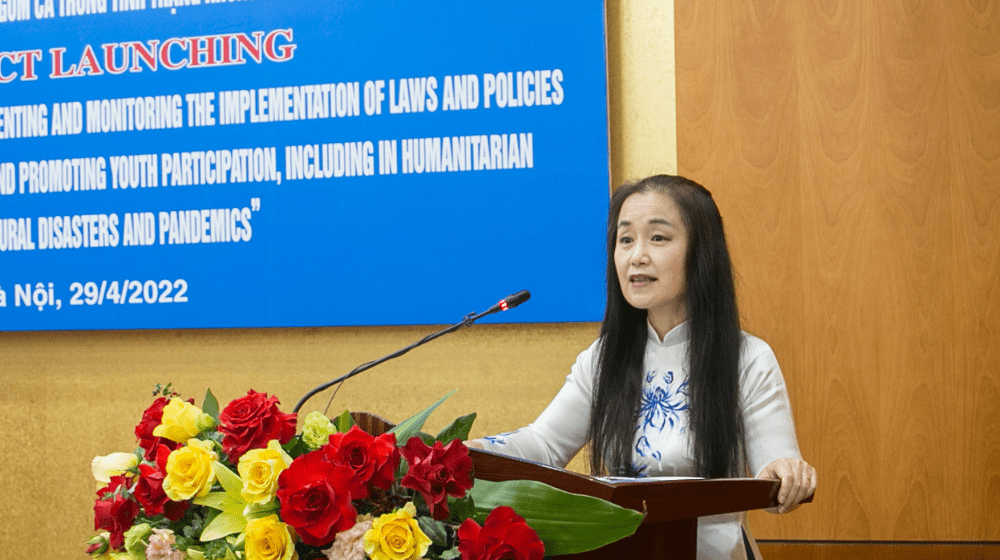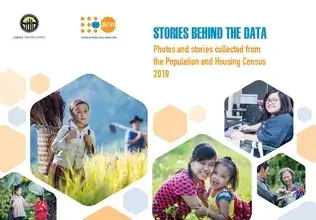Excellency Minister Pham Thi Thanh Tra, Minister of Home Affairs;
Representatives from the project implementing partners of MOET, MOLISA, National Assembly, and Youth Union;
Representatives from other line Ministries;
Youth Advisory group members;
UN and UNFPA colleagues and the media;
I am very pleased to be here today for the launch of the new project titled “Supporting the Government of Viet Nam in implementing and monitoring of the laws and policies for comprehensive youth development and youth participation, including in natural disasters and pandemics”, with a total budget of USD3,170,000 for five years from 2022 to 2026.
According to the 2019 Population and Housing Census, Viet Nam recorded the highest proportion of young people in the country’s history, creating the potential for a demographic dividend to accelerate socio-economic growth. Viet Nam’s 20.4 million young people, aged 10 – 24, accounted for 21% of the total population. The demographic window of opportunity, first identified in 2007, is projected to last until 2041, presenting Viet Nam with a unique opportunity to advance sustainable development.
UNFPA Viet Nam acknowledges and appreciates the effort of the Government in investing in adolescents and youth, and promoting their participation in socio-economic development of the country.
Dear participants,
Despite Viet Nam’s impressive socio-economic gains over the last decade, inequities and gaps must be further narrowed in terms of access to education, health care, particularly sexual and reproductive health care, job opportunities, and young people’s participation in policy development. Young girls from ethnic minorities, young migrant workers, young people with disabilities, those living with HIV/AIDS, LGBTIQ youth, and young sex workers are among the groups most vulnerable to health and other life-related risks, as well as those who are furthest behind in the country's development process.
For young people, there is a need for strategic and effective Life Skills and Comprehensive Sexuality Education (CSE). According to a national survey on Sexual and Reproductive Health (SRH) conducted among Vietnamese adolescents and young adults aged 10 to 24, Vietnamese adolescents and youth were not fully informed of SRH issues. The availability of LSE and CSE for in-school adolescents and you in locations including vocational training centers, colleges, and universities, must be there, and out-of-school adolescents and youth must be categorically targeted to ensure that Viet Nam’s young people are able to make informed and wise decisions about their health, and about their life, including when and with whom they can start a family, while balancing it with educational and professional career paths.
The report on Viet Nam’s youth published by MOHA in 2019 found that youth empowerment and participation in decision making process was still limited. Only 23.2 percent of youth thought their recommendations were sufficiently considered, and only half believed in their engagement in policy formulation.
Young people in general, but especially young people with disabilities, face barriers that increase their exposure to risks in situations of natural disasters and pandemics. People with disabilities are often disproportionately affected, and frequently face barriers in their daily lives in access to assistance and protection, esp in times of natural disasters and pandemics.
UNFPA’s new project in support for MOHA, which we are launching today, has been designed to fill in these gaps and to reaffirm our commitment to assisting the Ministry of Home Affairs and other implementing partners in ensuring that young people's rights to development, particularly access to Life Skills and Comprehensive Sexuality Education, are satisfied. Through this project, UNFPA, in collaboration with MOHA and other key partners, aims to empower and support young people, particularly those from vulnerable population groups, so that they can meaningfully participate in policy development and implementation, thereby actively contributing to Viet Nam's efforts to achieve SDGs by 2030.
As we gather here today, I would like to thank the Ministry of Home Affairs, particularly the Minister herself, for such strong leadership to put the issues of adolescents and youth high on national agenda. My thanks must also go to co-implementing partners, including the National Assembly’s Department of Culture and Education, the Department of Students Affairs of the Directorate for Vocational Training of the Ministry of Labor, Invalids and Social Affairs (MOLISA), the Central Center for Youth and Adolescents of the Viet Nam Youth Union, and the Department for Teachers and Educational Administrators of the Ministry of Education and Training (MOET) for their ongoing efforts and commitment to make this new project a success.
I look forward to working closely with all of you in effectively responding to the needs and rights of the Vietnamese young people and contributing to the achievement of the national sustainable development goals. Let us join hands to place adolescents and youth at the center of the national development, and assure no one is left behind.
Thank you for your participation and engagement!



